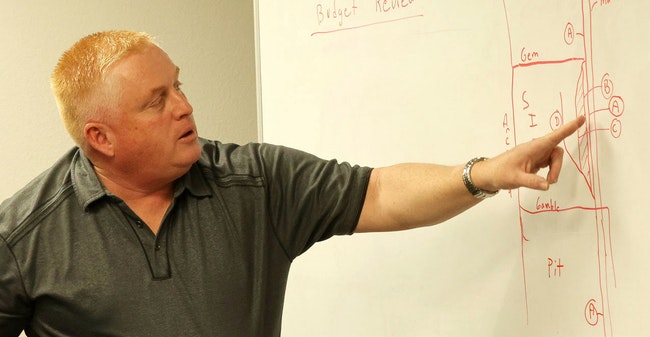Brad Baird, president of Anderson Perry & Associates, said in an earlier meeting that a change to his company’s contract for work on the reload center was being drafted, and should have been done earlier. (ANGIE SILLONIS/Special to the Enterprise)
The board of Malheur County Development Corp., which is managing the Treasure Valley Reload Center, last week approved a revised contract to award $1.8 million to its engineering firm – after much of that public money had been spent.
And the directors acted after the president of the engineering firm suggested his company’s work was under budget for the Nyssa project.
But public records obtained by the Enterprise show that Anderson Perry & Associates of La Grande would get a fee nearly $500,000 over budget.
Brad Baird, the engineering firm president, also told directors of the public company that his firm had been increasing its hourly fees under the 2019 contract on a yearly basis.
The contract, however, locked in those fees until the end of 2022, and Malheur County officials said they had no record of any amendment permitting Anderson Perry to bump up its fees.
The higher cost matters because the county project to serve the onion industry with rail shipments is millions over budget. Project officials recently canceled construction of the rail center building because they don’t have the money for it.
Baird didn’t respond to written questions about his contract presentation to the development company board on June 7. He said before the board vote on the contract change that his company already had been paid about $1.1 million.
Greg Smith, Malheur County economic development director who is paid to supervise such contracts, has a practice of not providing interviews or answering written questions from the Enterprise. Smith has been approving payments to Baird’s company even though they exceed the contract limit.
The development company’s action to revise the Anderson Perry contract follows a report in May by the Enterprise that found that the company at that time had been paid more than three times the contract limit of $250,000.
But his company also has been reporting the contract limit was higher, according to invoicing records obtained from the state Transportation Department.
Anderson Perry invoices have carried the notation: “Contract amount $600,000.”
The effect was to make initial invoices for payment appear to be under the contract amount and then subsequently not excessively over in more recent claims.
Invoices submitted for payment
Smith could produce no document authorizing the $600,000 level.
Last month, Baird didn’t respond to questions from the Enterprise about the discrepancy.
Under questioning last week from Grant Kitamura, president of the development company, Baird acknowledged that his company has increased the hourly rates it charges for its staff.
“It usually changes every year,” Baird said.
But the contract fixed those rates through December 2022. Smith’s team responded to a recent public records request by reporting that there was no amendment to the contract that provided for such rate increases.
Baird hasn’t responded to written questions about the legal authority to raise his fees.
Contract documents, for instance, set Baird’s rate at $200, and that has been increased to $225 an hour.
Baird was also questioned by one board member about how the total cost of the latest contract compared with the original estimate for engineering costs.
Corey Maag, a director of the development company, asked whether the $1.85 million was “less than or more than what our original initial budgeting amount was.”
Baird initially responded that he couldn’t recall, but would find the information and report back later in the meeting. He did so.
“There’s been so many different cost estimates but the best one I can find had the engineering around two to two-point-one million” dollars, he said, indicating the figure came from late 2018.
“We’re still under that total,” Baird said.
He didn’t identify the source of those numbers and didn’t respond to a request about where he got the figures.
The project team in September 2018 submitted a cost estimate to the state that listed engineering costs at $1.196 million.
In early 2021, Baird drafted a budget showing $1.1 million for engineering costs.
He and Smith were preparing a new report to show state officials how they intended to use the $26 million state grant that is funding the reload center.
Baird, though, told Smith in an email that he considered his engineering estimate “a little tight.”
They ultimately submitted a budget on Jan. 5, 2021, to the Oregon Department of Transportation that increased engineering costs to $1.4 million.
Now, the development company’s new contract with Anderson Perry exceeds that budget by more than $400,000.
There was no explanation at the board meeting of where the extra money would be found in a project already short of funding.
EXCELLENCE IN JOURNALISM – Available for $5 a month. Subscribe to the digital service of the Enterprise and get the very best in local journalism. We report with care, attention to accuracy, and an unwavering devotion to fairness. Get the kind of news you’ve been looking for – day in and day out from the Enterprise.




